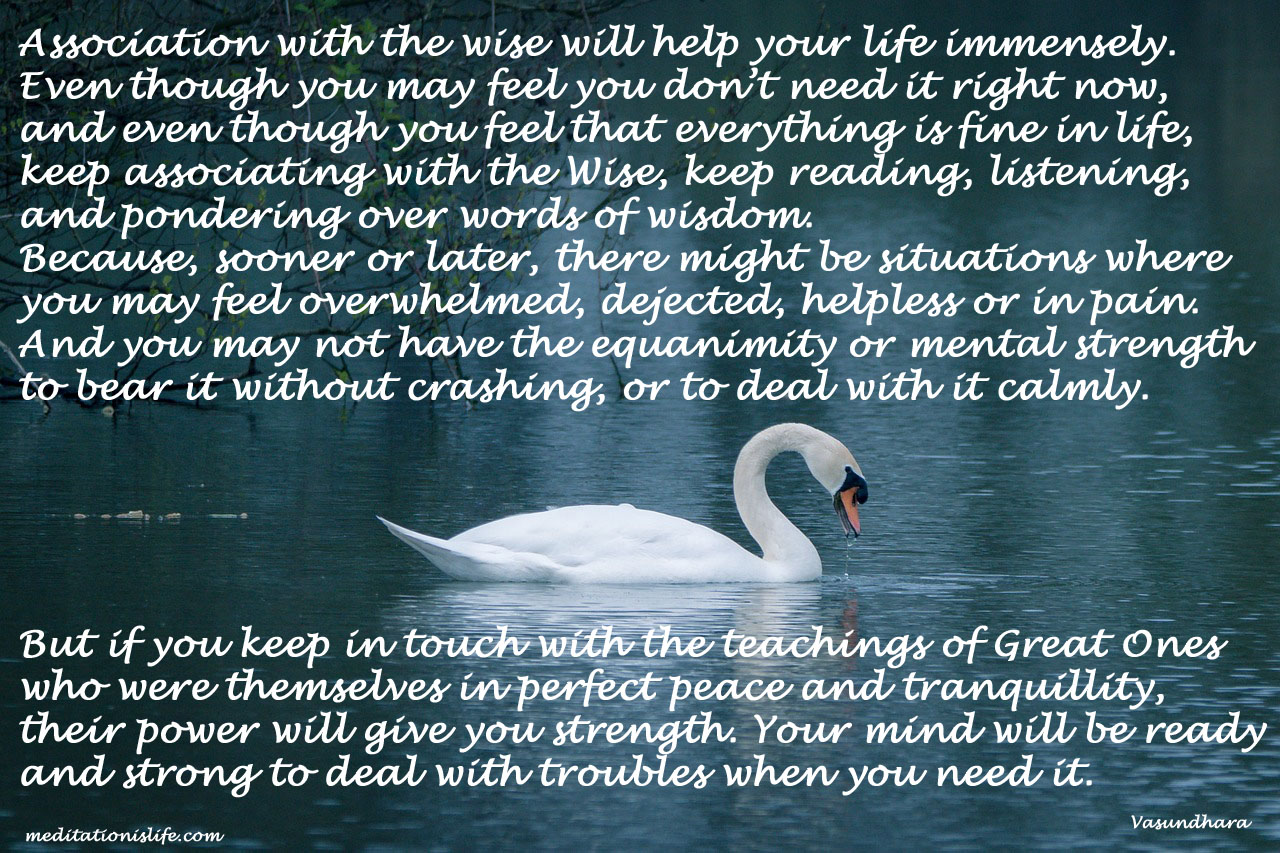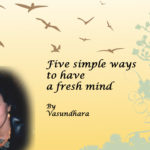What is Association with the Wise?

What is Association with the Wise? (Satsang)
The scripture Yoga Vashishtam has the following verse which aptly describes association with the wise:
The imperfect will become perfect, danger good luck, the inauspicious auspicious, by association with holy sages. For those who have bathed in the Ganges of fellowship with such realized souls, homa, yagna, penance, alms-giving, bathing in sacred rivers, are all unnecessary. Seek, therefore, by all means the company of the good and wise, which is a boat to carry one across the ocean of birth and death.
The word Satsang is used profusely in India, as well as all over the world. It is made up of two words – Sat and Sang. Sat means Reality. Sang means association. Together they become Sat-sang. The closest correct pronounciation for this word or phrase I can think of (for non-Indians) is “suhth sung”.
It is typically and commonly used to mean people getting together and either worshipping God, or singing devotional songs, or reading scriptures together or meditating together. It is association with other people who are good, noble and are spiritually inclined.
In a higher sense, it means keeping in touch with teachings of great Great Sages or Scriptures – reading, listening, pondering, contemplating or meditating.
But in the highest sense, it means keeping in touch with Reality, the True Self within. According to the Sages of India, we have digressed far away from our Real Nature of Pure Being; we have lost hold of it; we have limited ourselves to the ego and body, and consequently suffer from deluded views and activities of the world. It is like one who is delirious because of high fever. So associating with the Real Self is a sure way of regaining It and getting hold of It again. It is getting back Home.
But directly associating with the Real Self may not be easy after getting so far away from it. So it is essential that one keeps close touch with enlightened Sages. Those great peaceful Sages who have realized the True Self are not separate from the All-pervading Being. It is even said that the Real Self appears as these Sages only to guide sincere seekers to regain genuine peace and lasting happiness.
Even if these Sages are not physically accessible or available any more, mental contact with them is equally meritorious and effective. The mental atmosphere is what is called Ashram or Asramam. For example, Ramanasramam may be a physical entity. But the real “Ramanasramam” actually means “the mental atmosphere where the mental contact with Sri Ramana Maharshi exists and the presence of His Grace and Peace is felt and prevails”.
So association with the wise or Satsang means to be with them mentally, contact them mentally, to trace and understand the meaning and significance of their teachings, to absorb the essence of their wisdom, and to sincerely try to follow their recommended practices.
Associating with the Teachings and Guidance of Sages is the most important of all spiritual activities. Things may not be clear the first time or in the beginning. But the more we read, listen and ponder over them, the more they will become clear to us. In fact, Sri Ramana Maharshi said that people should read and keep reading such teachings and scriptures even though they do not understand their meaning. He said that they will be helpful anyway and facilitate wellbeing and peace of mind.
———————————————————–
Below are some conversations of devotees with Sri Ramana Maharshi or His quotes, where He explains Satsang, Association with the Wise, in His own words.
———————————————————–
Visitor: All that I want to know is whether Satsang is necessary and whether my coming here will help me or not.
Bhagavan: First you must decide what is sat sang. It means association with sat or Reality. One who knows or has realized sat (True Self) is also regarded as sat. Such association with sat or with one who knows sat is absolutely necessary for all.
———————————————————–
Sankara has said (Bhagavan here quoted the Sanskrit verse) that in all the three worlds there is no boat like sat sang to carry one safely across the ocean of births and deaths.
———————————————————–
A visitor asked how to realise oneself in accordance with Maharshi’s instructions, contained in his text of Truth Revealed (Forty Verses to Reality) verse 9, supplement. The difficulty was in controlling the mind.
M.: It is to be done by controlling the breath. If you practise it by yourself without other help, then the mind is controlled. Otherwise the mind comes under control spontaneously in the presence of a superior power. Such is the greatness of association with the wise (satsanga).
———————————————————–
The Pandit remarked that thoughts are so persistent that the aham cannot be reached.
The Master said: The Brahmaakaara vritti helps to turn the mind away from other thoughts. Either some such practice is necessary or association with sadhus should be made. The sadhu has already overcome the mind and remains in Peace. His proximity helps to bring about such condition in others. Otherwise there is no meaning in seeking a sadhu’s company.
———————————————————–
An American Engineer asked about sat-sanga (association with sages).
M.: Sat is within us.
———————————————————–
Mr. B. C. Das, the Physics Lecturer, asked about free-will and destiny.
M.: Whose will is it? ‘It is mine’, you may say. You are beyond will and fate. Abide as that and you transcend them both. That is the meaning of conquering destiny by will. Fate can be conquered. Fate is the result of past actions. By association with the wise the bad tendencies are conquered. One’s experiences are then viewed to their proper perspective.
Free-will is implied in the scriptural injunctions to be good. It implies overcoming fate. It is done by wisdom. The re of wisdom consumes all actions. Wisdom is acquired by association with the wise, or rather, its mental atmosphere.
———————————————————–
Dr. Lohara: Why does the mind not sink into the Heart even while meditating?
M.: A floating body does not readily sink unless some means are adopted for making it do so. Breath-control makes the mind quiescent. The mind must be alert and meditation pursued unremittingly even when it is at peace. Then it sinks into the heart. Or the floating body might be loaded with weights and made to sink. So also association with the wise will make the mind sink into the Heart.
Such association is both mental and physical. The extremely visible being (of the Guru) pushes the mind inward. He is also in the heart of the seeker and so he draws the latter’s inward-bent mind into the Heart.
———————————————————–
D.: How can one become jitasangadoshah (free from the stain of association)?
M.: By satsanga (association with the wise).
“Satsangatve nissangatvam, nissangatve nirmohatvam, nirmohatve
nischalatatvam, nischalatatve jivanmuktih.”
Satsanga means sanga (association) with sat. Sat is only the Self. Since the Self is not now understood to be Sat, the company of the sage who has thus understood it is sought. That is Sat-sanga. Introversion results. Then Sat is revealed.
Note: The verse in sanskrit above was rendered by Sri Adi Sankaracharya in Bhaja Govindam. It means:
Association with the wise leads to dissociation with the unwise;
Dissociation with the unwise leads to removal of passions;
Removal of passions leads to the state of perfectly stable mental tranquillity;
Perfectly stable mental tranquillity leads to salvation of the soul.
———————————————————–
D.: When duhka (misery) overpowers me, enquiry is impossible.
M.: Because the mind is too weak. Make it strong.
D.: By what means?
M.: Sat-sanga, Isvara Aradhana, Pranayama – (association with the wise, worship of God, breath control).
———————————————————–
True, that in the proximity of a great master, the vasanas will cease to be active, the mind becomes still and samadhi results, similar to re not scorching because of other devices. Thus the disciple gains true knowledge and right experience in the presence of the master.
———————————————————–
To another question Master said: The best is heart to heart speech and heart to heart hearing. That is the best upadesa.
D.: Is not guidance from Guru necessary?
M.: Are you apart from Guru?
D.: Is proximity helpful?
M.: Do you mean physical proximity? What is the good of it? The mind alone matters. The mind must be contacted.
———————————————————–
D.: Seekers who are in immediate proximity of the Master can get grace by darsana, sparsana, etc. (look, touch, etc.). But how does one get the same grace when the person is at a distance?
M.: By yoga drishti (yogic look).
———————————————————–
Below are some conversations of devotees with Sri Nisargadatta Maharaj, where He explains Satsang, Association with the Wise, in His own words.
———————————————————–
Q: A friend of mine used to have horrible dreams night after night. Going to sleep would terrorise him. Nothing could help him.
M: Company of the truly good (satsang) would help him.
Q: Life itself is a nightmare.
M: Noble friendship (satsang) is the supreme remedy for all ills, physical and mental.
Q: Generally one cannot find such friendship.
M: Seek within. Your own Self is your best friend.
———————————————————–
Q: I was told that the liberating action of satsang is automatic. Just like a river carries one to the estuary, so the subtle and silent influence of good people will take me to reality.
M: It will take you to the river, but the crossing is your own. Freedom cannot be gained nor kept without will-to-freedom. You must strive for liberation; the least you can do is uncover and remove the obstacles diligently. If you want peace you must strive for it. You will not get peace just by keeping quiet (idle).
———————————————————–
Q: You told a questioner that we are the same, that we are equals. I cannot believe it. Since I do not believe it, of what use is your statement to me?
M: Your disbelief does not matter. My words are true and they will do their work. This is the beauty of noble company (satsang).
———————————————————–
The true teacher…will not imprison his disciple in a prescribed set of ideas, feelings and actions; on the contrary, he will show him patiently the need to be free from all ideas and set patterns of behaviour, to be vigilant and earnest and go with life wherever it takes him, not to enjoy or suffer, but to understand and learn.
Under the right teacher the disciple learns to learn, not to remember and obey. Satsang, the company of the noble, does not mould, it liberates.







 Great Scriptures of India
Great Scriptures of India Sages From India Teachings
Sages From India Teachings Sri Ramana Maharshi Teachings
Sri Ramana Maharshi Teachings Versatile Recipes
Versatile Recipes